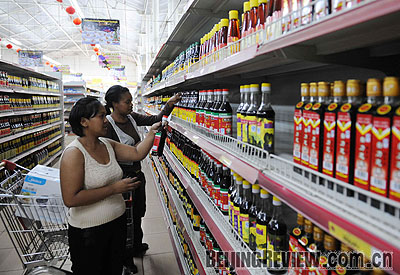|

CHINESE SUPERMARKET: Local people shopping in the Horizon Ivato, a supermarket funded by China in Antananarivo, capital of Madagascar
In recent years, the development of Sino-African economic and trade sectors can be seen in the rapid growth of bilateral trade, the stable development of China's investment to Africa, effective cooperation in basic infrastructure fields, remarkable achievements in China's assistance to Africa and exploration of new fields of bilateral cooperation.
Statistics from the Ministry of Commerce show that the value of Sino-African trade exceeded $10 billion in 2000, with an annual growth of more than 30 percent in the seven successive years after that. In the first nine months of 2008, the trade volume between the Chinese mainland and 53 African countries hit $83.41 billion, a year-on-year growth of 59 percent. Of this amount, China's exports reached $45.78 billion, up 78 percent, and imports hit $37.64 billion, up 41 percent. China mainly exports mechanical and electrical products, hi-tech commodities, steel products, textile, and clothes and shoes. Chinese products are applauded by the African people. At the same time, African products also attract more Chinese consumers because of their uniqueness and varieties. Sesame from Ethiopia, long staple cotton from Egypt, tobacco from Zimbabwe and diamonds from South Africa are all favorite commodities for Chinese consumers.
To increase imports from African countries, China has taken a series of measures under the framework of the Forum on China-Africa Cooperation, for example the zero-tariff policy on some commodities from the least developed African countries. By the first half of 2008, China had totally imported commodities with preferential tariffs worth $620 million from Africa. This policy plays positive roles to some extent in expanding Africa's exports to China and promoting healthy development of trade between China and Africa. In addition, the Chinese Government also intensifies China's imports from African countries through holding African Commodities Exhibitions and organizing purchasing delegations to Africa, so as to reduce the trade deficit on the African side.
The latest statistics from some African countries show that their economies are currently in an unprecedented best form. Except for a few countries, most African countries have entered a new stage of stable economic growth. In the past five years, Africa's annual economic growth exceeded 5 percent. In 2007, the growth rate of Africa as a whole reached 6.2 percent. According to the International Monetary Fund, Africa is in its best stage of continuous development and low inflation.
|
